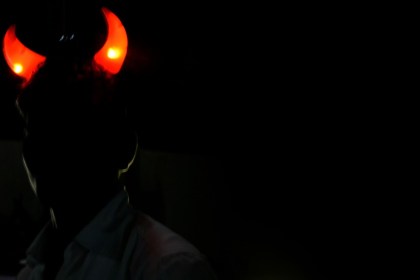There’s a funny video going around social media showing a boy pulling a sheep out of a tight ditch. When the boy finally frees the sheep, the sheep excitedly bounds away and, possessing the average intelligence of a sheep, leaps into the same ditch. Often the caption is attached: “Some days when Jesus shepherds me.”
 I am having one of those moments.
I am having one of those moments.
The last couple of weeks have not been my most stellar. I have not felt on my “A” game. In fact, I have felt I urge to be relegated back to the Peewee League of life.
Many nights, I have laid in bed this week, staring up at the ceiling and thinking, “I am a grown man. How did I miss this?”
I couldn’t even ask what I was thinking because clearly I wasn’t thinking.
What has been the most frustrating part was that I did nothing rebellious or intentional, just—well—stupid.
I have felt like the more I try to focus, the more thoughtless I have become. The more fires I try to put out, the more fires are started by my own hand.
If I was in the Bible, I would have been Uzzah walking alongside the ark of the covenant on its return to Jerusalem. I see it tip, reach out my hand to steady it, then–zap–I am remembered for my thoughtless blunder for all eternity.
That’s the kind week its been.
We all have times like this. Some of us have no trouble making amends, rectifying the mistake(s), and moving on.
 Unfortunately, even after successfully doing the first two steps, I often have trouble with the last part–“moving on.” My tendency is instead to make sure I take ample opportunity to beat the crap out of myself for committing such a faux pax in the first place.
Unfortunately, even after successfully doing the first two steps, I often have trouble with the last part–“moving on.” My tendency is instead to make sure I take ample opportunity to beat the crap out of myself for committing such a faux pax in the first place.
How could I let [insert latest faux pax here] happen? I question my abilities and even doubt my calling. I demand to know how I could be so stupid, or how I neglected to catch something so obvious.
Then I spiral.
Into full-blown depression.
It’s kind of the way I am wired.
This morning, I shuffled into church when I clearly would have rather crawled under a rock. A cloud of self-condemnation hung over my head. Up to the point of actually entering the church, I entertained the thought of not even going this morning and just taking a drive to anywhere but here.
I crept in after the service started and found the furthest corner to sulk in.
I was pretty sure this would be a waste of time. I avoided eye contact as best I could. I didn’t want to worship today. I didn’t want to hear from God. I just wanted to beat myself up.
My attitude was sour. My filters were down.
Then Jesus pushed himself in.
It came through the second worship song:
My hope is built on nothing less
Than Jesus blood and righteousness
I dare not trust the sweetest frame
But wholly trust in Jesus’ name[1]
These words derailed my self-loathing. For the last several days, my entire focus has been on me: my stupid mistakes, my shortcomings, my self-pity. In other words, the more I condemned myself for my stupid mistakes, the more I removed my focus from the Shepherd.
Of course I am going to be depressed.
The first line of this song, however, tore my focus from self and back onto Jesus.
Jesus alone has to be our source of hope. I have to place my hope in him and not in my performance and accomplishments.
Christ alone, Cornerstone
Weak made strong in the Saviour’s love
Through the storm, He is Lord
Lord of all.
Christ alone.
It’s an easy claim to make when life is rosy and lush.
However, it is another thing when you’re uttering those words ensconced head-first in the bottom of a ditch.
Through the storm. Lord of all.
I think when we beat ourselves up over our mistakes, bad decisions, and just plain carelessness, we are implying that life is not about Jesus but about ourselves. The world is all about me — my successes, my failures, my achievements, and my mistakes. Truthfully, though, the one who benefits the most from this kind of self-condemnation is the enemy.
Instead, Jesus sticks his head into the ditch next to my stuck body, says, “I got ya,” before pulling me out by the leg.
The truth is, I am likely going to wind up in that ditch again. I wish I could say otherwise. But that’s what it means to be human.
However, real discipleship occurs not by boasting how we can avoid the ditch but by how we can utter the words “Christ alone” while head-first within it.
Whether it’s the first time we’re there or when we stupidly find ourselves there again.
[1] “Cornerstone,” Hillsong Worship
The latest in Christian reading
Leave a Comment







